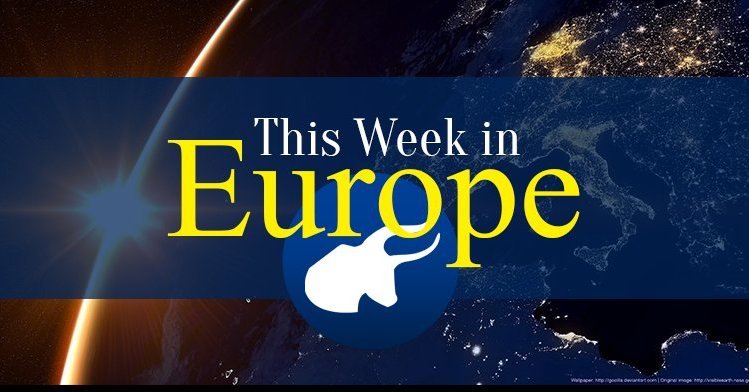Former IMF director sent to jail
On Thursday, Rodrigo Rato, former managing director of the International Monetary Fund and former finance minister of Spain, began serving his 4-year jail sentence for his participation in a credit card fraud scheme. As the head of the state-owned Bankia, Rato was charged with embezzlement together with 64 other senior executives of the bank. The former IMF chief accepted all of his mistakes and asked for forgiveness in front of the press. Rato and his associates used company credit cards to buy clothes and jewelry valued at over €12 million between 2003 and 2012, while the bank they were managing collapsed. Other Spanish officials, such as the former secretary of state for the treasury, as well as trade union chiefs, are already serving sentences in connection to the case. Miguel Blesa, Rato’s predecessor as head of the bank, committed suicide months after being sentenced to 6 years in prison. Rato was part of the conservative People’s Party and was a member in the Aznar government together with Mariano Rajoy, former Spanish PM, who denied knowledge of the fraud scheme when he appeared before the court, the first Spanish PM to do so in history.
Commission concerned over Romania’s judicial changes
On Tuesday, the European Union warned Romania, which will assume the rotating presidency of the bloc in January, that its judicial “reforms” may undermine its bid to join the Schengen area. The ruling Social Democrats of Romania have recently promoted a series of changes to the penal code which the opposition and NGOs deemed unconstitutional and favoring of politicians charged with corruption. In a debate within the European Parliament, Commission president Jean-Claude Juncker warned the Romanian president Klaus Iohannis that the country should continue following European principles of law. Manfred Weber, who aspires to replace Juncker in the Commission, called for Bulgaria and Croatia to join Schengen immediately but left out Romania. Guy Verhofstadt, whose Romanian representatives of ALDE are in government, also urged Romania to not follow the example of Poland and Hungary, while EU Commission VP and Social Democrat Frans Timmermans asked clarifications from Romanian PM Viorica Dancila. Prosecutors in the country have had success in ridding the country of high-level corruption, but are now being subordinated to the PSD and ALDE-appointed minister of justice, despite massive protests from the people.
Higgins re-elected as Irish president
This week, Ireland re-elected its president, Michael D. Higgins, with 56% - over 800.000 - of the votes, the runner-up receiving 23.1%. Higgins was the first incumbent in 50 years to face a challenge in his bid for a second term at the presidency. The president argued for a future with “strong sustainable communities” in which the Irish are “equal and together”. Turnout was low, however, with many of the 3.2 million people eligible to vote refraining from doing so, with the role of the president largely being ceremonial. Moreover, 64.85% of the voters were in favor of removing blasphemy as an offence from the Constitution. Many of the Irish were unaware that such an offence existed until the actor Stephen Fry spoke about God’s cruelty and was referred to the police by a member of the public. The investigation was later dropped when the police couldn’t find anyone who was offended. The last person to be prosecuted for blasphemy was in 1855, under British rule.
ALDE votes out Catalan independence party
On the one-year anniversary of the Catalonian bid for independence, the Alliance of Liberals and Democrats for Europe (ALDE) in the European Parliament voted out PDeCAT, the region’s separatist party and the party of the former Catalonian leader Carles Puigdemont, now in exile in Belgium. In an extraordinary meeting on Saturday, ALDE delegates expelled the party, holding however that the decision did not imply any official position of the group on the issue of Catalan independence. The liberals went through with the vote after an investigation into corruption charges was followed against the CDC, the predecessor of PDeCAT. Back in September, ALDE argued that PDeCAT, irrespective of its stance on independence, was “engaging in acts that are contrary to the interests and values” of the group. On the same day, Puigdemont launched another party - The Call, which will hold its first meeting in a town near the prison where several independence leaders are imprisoned.
Albania bans sports betting and casinos
On Thursday, the Albanian parliament banned sports betting and restricted casinos in an attempt to counter organized crime. The law that was passed bans a very large betting industry - 4.200 sports betting offices, despite the country’s poverty - and includes online betting. At present, Albanians spend up to €150 million annually wagering on sports, with figures going up as far as €700 million when accounting for illegal bets. Furthermore, casinos are now restricted to 5-star hotels in licensed tourist resorts. While the governing party argues that the measure will help Albanian society, the opposition has been boycotting parliamentary sessions for weeks and did not take part in the vote. Previously, Albania’s leading football club, Skenderbeu, was suspended for 10 years from all European competitions on suspicion of having fixed 53 matches.
Former Croatian PM found guilty of war profiteering
On Monday, Ivo Sanader, the Croatian Prime Minister between 2003 and 2009, was found guilty of war profiteering by the Zagreb County Court and sentenced to two and a half years in prison. However, he was acquitted in a second case after the only prosecution witness died. As deputy foreign minister in Croatia’s 1991-1995 war for independence, Sanader took 3.6 million kuna, or half a million dollars, from the Austrian bank of Hypo-Alpe Adria bank. The money was meant for raising capital for Croatian embassies, but Sanader kept it. He was arrested while attempting to flee in a car in Austria in 2010 and was taken back to Croatia. In the second case, Sanader was accused of enticing the CEO of a power utility company to sell electricity at a certain price. The CEO, however, died, and his recorded testimony was ruled as inadmissible. Sanader also has several other cases of bribery pending.
European Commission rebukes Italy’s proposed budget
For the first time, the Commission has said that a eurozone member must revise its proposed budget after deciding that it did not fall within the currency union’s rules. Though the decision was expected, the unprecedented nature means it is not without controversy. While the Commission argues that the budget proposal would add more debt to Italy’s struggling economy, the populist Italian government insists it will not change course and that there is no “plan B”.
ECJ fights back on Polish judicial independence
Following a European Court of Justice ruling, Poland’s supreme court has instructed all judges to return to their work. The Polish government had attempted to force out a number of senior judges by lowering the compulsory retirement age as part of an attack on judicial independence. The ECJ has since ruled against Poland’s government and declared that the law must be suspended.
Germany declares halt on Saudi arms sales
German Chancellor Angela Merkel has called for a halt to arms sales to Saudi Arabia following the killing of journalist Jamal Khashoggi. Describing the killing as a “monstrosity”, Merkel said at a campaign rally that there would be no more arms exports to Saudi Arabia until it had cleared up exactly what had happened. Economy Minister Peter Altmaier has called upon other EU states to follow Germany’s lead but there has been little action so far, with French President Macron even saying that such moves were “populist”.
Mélenchon looks to form new far-left group in Europe
The leader of La France Insoumise and the former socialist Emmanuel Maurel announced their union this week. They have formed an electoral union for the upcoming European Elections that will likely be based on maintaining their separate parties while working on a common platform and possibly a single list of candidates. The pair wants to make the European Elections in France a referendum on Macron’s presidency and have positioned themselves as strongly in favor of national sovereignty. It is in this vein that the far-left politicians have decided to lend their support to the far-right government in Italy and its conflict with the European Commission over its budget proposal. This new focus for the far-left in Europe has resulted in La France Insoumise splitting from the existing radical left group in the European Parliament (GUE-NGL), with the intention of forming a new one.


Follow the comments: |
|
